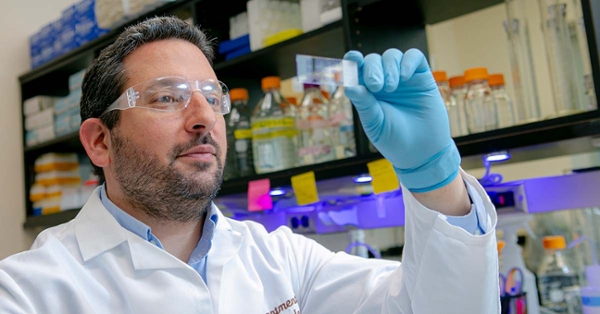Studying how experimental drugs curb opioid abuse and more: Rowan researchers awarded 13 N.J. Health Foundation grants
Studying how experimental drugs curb opioid abuse and more: Rowan researchers awarded 13 N.J. Health Foundation grants

Pre-clinical studies on how experimental drugs reduce opioid abuse, multiple studies of new cancer treatments and the testing of antiviral medications are just a few of the 13 projects for which Rowan University researchers were awarded grants this spring from New Jersey Health Foundation (NJHF).
Each year, NJHF awards grants to advance health research and innovation at New Jersey organizations. In 2022, Rowan researchers received more than $433,000 in the form of research and community health grants from NJHF.
Dr. Daniel Manvich, assistant professor in the Department of Cell Biology & Neuroscience at Rowan University School of Osteopathic Medicine, is using his $34,878 grant to learn how an experimental class of drugs reduces the rewarding effects of opioids.
Opioids affect the brain in part by increasing levels of dopamine, a neurotransmitter involved in the brain’s rewards systems. Dopamine binds to five proteins called dopamine receptors. In pre-clinical testing, experimental compounds that selectively targeted D3 receptors blocked abuse-related effects of opioids.
“We know that D3 receptors are important for these drugs’ effects, but what we don’t know, from a neuropharmacological or neurobiological perspective, are the precise mechanisms by which these drugs are reducing the impact of opioids,” said Manvich. “There’s value to figuring out how these drugs are working to achieve their therapeutic effects, because that can help us develop more effective and selective medications to bring to clinical trials.”
With the NJHF grant, Manvich can now start unraveling these mechanisms by using a relatively new technique called in vivo fiber photometry, which makes use of biosensors that can program dopamine neurons to emit fluorescent light when they are activated.
“This grant from New Jersey Health Foundation gives us the opportunity to get this brand-new equipment up and running at Rowan,” Manvich said, thus enabling him to apply for more extensive funding from the National Institutes of Health for the next phase of his research.
“We are proud to continue to support the valuable research and innovation of scientists and others throughout our state,” explained George F. Heinrich, M.D., vice chair and CEO of New Jersey Health Foundation. “We are energized by the potentially breakthrough science being performed at this outstanding organization.”
Other Rowan faculty with new NJHF funding include:
- Dr. Claude Krummenacher, Molecular & Cellular Biosciences and Biological Sciences, for research in the development of broad-spectrum antiviral compounds against coronaviruses and herpesviruses;
- Dr. Ping Lu, Chemistry & Biochemistry, for research into a delivery system for a widely used anti-cancer drug that uses 3D scaffolds made from nanofibers;
- Dr. Gary L. Thompson, Chemical Engineering, for research in the uses of precisely tuned electrical treatments to inhibit the migration and metastasis of cells of a brain tumor type that’s particularly difficult to treat;
- Dr. Randy Strich, Molecular Biology, for the analysis of drug concentrations and combinations used in animal studies of a new anti-cancer drug regimen for pancreatic adenocarcinoma tumors;
- Dr. Jeremy Francis, Cell Biology & Neuroscience, for research in metabolic risk factors in age-related dementia;
- Dr. Rachel Riley, Biomedical Engineering, for research in engineering lipid nanoparticles as a novel approach for treating preeclampsia;
- Dr. Rashanique Quarels, Chemistry & Biochemistry, for research in developing a flexible platform for the synthesis of antibiotics vancomycin and related glycopeptides;
- Dr. Katrina Cooper, Molecular Biology, for research in the role of the protein Cyclin C in disorders involving structural abnormalities of the TDP-43 protein;
- Dr. Mitja Trkov, Mechanical Engineering, for research in the use of a soft robotic instrumented pad to prevent pressure injuries among bed-bound patients and wheelchair users;
- Dr. Behrad Koohbor, Mechanical Engineering, for research in the correlations between the mechanical properties of orthopedic shoe midsoles and user performance;
- Dr. Christina Simmons, Psychology, for the development and testing of virtual reality physician training on compassionate treatment of patients with autism;
- Lisa Bodenheimer, New Jersey Institute for Successful Aging, to train facilitators in advanced-care planning for state-funded programs and senior congregate housing sites.